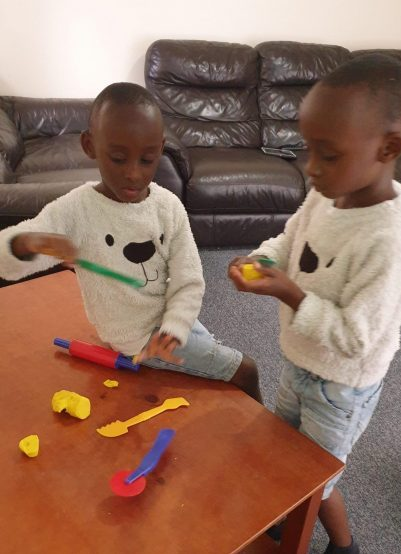 Our Sydney-based Occupational Therapist and Team Leader Mary Vargas has been working with autistic identical twins Ali and Abraham for four years, and in that time their playing, learning and self-care skills have developed in leaps and bounds!
Our Sydney-based Occupational Therapist and Team Leader Mary Vargas has been working with autistic identical twins Ali and Abraham for four years, and in that time their playing, learning and self-care skills have developed in leaps and bounds!
Ali and Abraham, who are now six years old, were born at just 26 weeks gestation. Since then, their mum has been on a journey to support them to develop independence in as many aspects of their lives as possible.
Mary started working with the family when the twins were two years old. At the time, they were non-verbal and just starting to learn about the world around them through exploratory play.
Like other autistic children, Ali and Abraham had difficulties understanding and using spoken language and needed support to learn and practise skills for communicating with other people. They also needed help from Mary to develop skills for play, self-care and learning situations.
“My role as an occupational therapist is to work with children like Ali and Abraham to increase their ability to participate in their everyday activities to the best of their ability,” Mary says.
Self-care
Occupational therapy for children can help children learn to look after themselves through self-care activities such as feeding, toilet training, bathing and dressing. They also support families to help children with these activities.
When she first started working with Ali and Abraham and their mum, Mary was focused on expanding their diets from baby milk and pureed foods. Sometimes autistic children have selective eating habits – often as a result of sensory sensitivities – which means they only eat a limited range of food and this can affect their health and development.
Therapy sessions have also targeted the twins’ tolerating having their teeth brushed and getting them involved in their dressing and toileting. Over time, they have made substantial progress in each of these areas.
“Both of them have tried solid food and are more consistently eating, and they can brush their own teeth. They can now also get dressed more independently and can follow the toileting routine, with one of them doing wees in the toilet at home,” Mary says.
Play and communication
For children with autism, play skills can be delayed, but support from occupational therapists like Mary can develop these skills to help the child’s learning and development.
Mary worked closely with the twins and their mother on a range of activities, including people play (being very emotive and incorporating singing into routines). For example, she would sing the Wiggles handwashing song to transition the twins into washing their hands prior to feeding therapy.
Mary also incorporated motivating characters, like Thomas the Tank Engine, into learning activities, and built their mum’s capacity to continue with strategies outside of therapy sessions.
Over many sessions, Mary also worked with the twins and their mum to develop their communication skills so the children can express their needs and wants, which in turn helps them with behaviour, learning and socialising.
Both twins can now play with a variety of toys in functional ways, and are intentional with their communication. One of the twins is also now verbal.
“I am extremely proud of them and the work their mum has put in to get them to where they are today,” Mary says.
“I still get so excited to see them for my therapy sessions and I’m even more excited to say that they haven’t gotten sick of seeing my face!
“It’s been so wonderful to see and support them through the transition from weaning them off baby bottles to learning to sit at a table for activities, to then transitioning into kindergarten and then to receiving their first school awards.”
Bright future
After such strong early intervention, Mary is optimistic about a bright future for the twins.
“Since being invited on their journey, I’ve seen Ali and Abraham grow physically (they’ve grown almost twice as tall), developmentally, and into their own unique personalities,” she says.
“With the way they’ve progressed with therapy so far, I see them continuing to make mum proud and continuing to surprise us with gains.
“I have been super lucky to work with Ali and Abraham as their OT for the last four years!”

